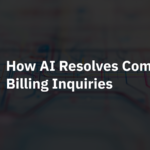The Scalability Crisis Facing Modern Enterprises
Technology often fails to keep up with business growth. Automation that’s supposed to streamline operations becomes a patchwork of disconnected systems and rigid workflows. These tools drain resources and limit flexibility. What starts as a solution becomes another obstacle to growth and deploying AI.
Growth introduces new workflows, compliance rules, and integration requirements. Traditional automation can’t adapt fast enough. Teams spend more time maintaining tools than improving them. Legacy systems break under pressure and keep businesses stuck.
Agentic platforms like Krista orchestrate full business processes across teams and systems. They adjust in real time, understand context, and evolve without needing constant manual updates. This agility unlocks efficiency, drives innovation, and keeps teams moving.
Why Traditional Automation Crumbles Under Growth Pressure
Rigid Workflow Architecture
Most automation platforms operate on fixed rules, predefined paths, and rigid integrations. They handle repetitive tasks like processing invoices or updating CRM records but struggle when conditions change.
Adding a product line or opening a new office forces teams to rework their automations. A sales order process might work for domestic customers, but international expansion brings new tax rules and shipping policies.
Workflow changes often require developers. That delays growth and keeps business users waiting. These delays turn automation into a bottleneck.
Automation That Can’t See the Bigger Picture
Traditional automation can’t respond to changing priorities or conditions. It treats every task the same. Whether it’s a high-value client or a seasonal rush, the system applies one set of instructions.
This rigidity slows progress. Employees step in to fix exceptions. Automation becomes manual again, only with more overhead.
Krista understands business context and adjusts in real time. It prevents delays and helps teams work smarter.
When Systems Multiply, Automation Breaks
Companies adopt more systems, data, and applications as they expand. Traditional automation can’t keep up. Every integration adds complexity. Each update risks breaking something else.
This adds technical debt. IT spends more time fixing problems than driving new capabilities. Automation becomes a burden instead of a driver of scale.
Krista handles this growth. It connects systems using reusable agents and natural language, not brittle code.
Why Scaling Sends Your Costs Soaring
Automation seems affordable at first. But as operations grow, costs grow faster.
- Maintenance work increases with every change to workflows
- Training takes longer as more people interact with more tools
- Infrastructure demands more licenses, processing power, and support
What starts as a cost-saving initiative becomes a major line item. And each additional dollar returns less value.
The Agentic Platform Difference: Adaptive Scaling by Design
Automation That Drives Results, Not Just Tasks
Agentic platforms deliver outcomes, not just task automation. Krista aligns automation with business goals. It adapts execution to meet changing requirements without reconfiguration.
A support workflow can grow from handling simple FAQs to resolving advanced product issues. Krista adjusts automatically and continues to deliver results.
Speak Naturally, Automate Instantly
Automation shouldn’t require a manual or months of training. Krista removes the complexity. Teams interact with AI agents using plain language.
Employees start contributing immediately. Global teams work in their own language. Everyone shares the same intuitive experience.
Krista makes automation usable for the whole company and not just your most technical users.
Secure, Compliant, and Built to Scale
Security and compliance become harder to manage with more people, departments, and regions. Traditional platforms patch these requirements onto existing workflows, which leads to blind spots.
Krista enforces access controls, audit trails, and compliance policies at the core. It adjusts automatically to match roles, policies, and regulations without manual effort.
This built-in security model removes the need for separate tools or disconnected enforcement. Krista protects the business while keeping workflows efficient.
Why Bigger Doesn’t Have to Mean Slower
Most automation tools can’t handle complexity. They break down as more users, systems, and workflows are added. Productivity slows, and support costs rise.
- Krista simplifies complexity: She runs complete processes from start to finish, coordinating across departments and systems.
- Krista keeps overhead low: She does the work and involves people as needed even as your business scales.
- Krista removes burdens: She enables your teams to focus on strategy and growth.
- Krista scales with you: She turns scale into an advantage, not a liability.
Want to see how Krista simplifies complexity and scales with your business? Contact us to learn more or schedule a demo.




